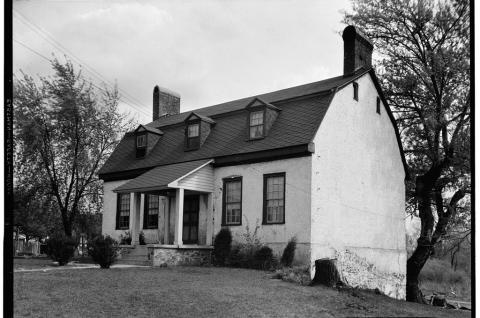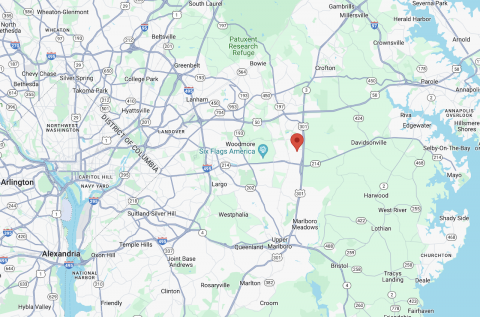Bowie Ancestors Project
Mission Statement
The Bowie Ancestors Project seeks to locate descendant communities to consult alongside community leaders and faith leaders during the reburial process. The University of Maryland (UMD) hopes that by initiating and participating in transparent communication led by the communities and groups most connected to the seven African American individuals and the broader Magruder Plantation descendant community that knowledge, healing, and closure may be found.
A Brief History
In 1987, human remains were discovered during a house construction in Bowie, Prince George's County, Maryland. Because the cemetery was not known to the landowners, there was no legal provision for the immediate reburial of the graves. As was common practice at that time, the remains were turned over to UMD. Historical research suggests that the graves are part of a larger cemetery associated with the African American community at Magruder Plantation. The cemetery likely dates to the early to mid-1800s, but precise dating is not possible.
Analyses were performed by anthropologists at UMD in the late 1980s and by the Smithsonian Institution in 2010. The burials were determined to be from seven individuals of African descent (four women and three men), aged from late teens to over 60 years old. Their skeletons reflect the physical labor and nutritional stresses that these women and men endured. UMD wishes to extend dignity and respect for these women and men through reburial — following the wishes of descendant communities, local community leaders, and local faith leaders.

|

|
| Magruder House, 4703 Annapolis Road (Bladensburg Road), Bladensburg, Prince George's County, MD. Image retrieved from the Library of Congress, https://www.loc.gov/item/md0495/. | The red pin indicates the general location that the remains were recovered from. This cemetery site has been documented by the Maryland-National Capital Park and Planning Commission. |
Current Disposition of Ancestral Remains
Ancestral human remains within the possession of UMD were accessioned for curation when they were unintentionally uncovered and subsequently exhumed in 1987. The current policy of the Maryland Historical Trust discourages the excavation of human remains and strongly encourages preservation in place. However, at the time that the remains were found, there was no legal provision for the excavation or reburial of human remains.
Human remains from seven individuals are currently being cared for at UMD. It was determined that the seven sets of human remains are from four women and three men of African or possible African American descent. Following regulations outlined by the Maryland Historical Trust, all remains are housed in "an appropriate place of repose" at the university. This secure location dedicated solely for the disposition of these human remains and assures that:
- the remains are not in open view of the general public;
- the remains are kept in conditions conducive to long-term preservation;
- specific individuals or groups of remains are not intermixed with remains unrelated by ethnicity, descent, or place of recovery;
- the remains of specific individuals or groups of related remains can be removed if necessary;
- remains are not made accessible to members of the public except as may be permitted by the project advisory board.
In addition to following the regulations outlined above, the remains have been shrouded as a measure of respect until a reburial and memorialization can be arranged.
Descendant community members are welcome to visit the remains in this space until the ancestral remains reach their final resting place.
Next Steps
An advisory board comprised of UMD researchers, community leaders, and descendants are collaborating to facilitate the respectful repatriation (reburial and memorialization) of these remains. This project aims to intentionally engage with descendant communities of care through mutual collaboration with the hopes of taking a path towards reburial that encompasses the wishes of the majority of the community most impacted. In doing so, it is our hope that this project fosters healing for the communities impacted.
If you have information about African American communities associated with the Magruder plantation of Prince George's County, Maryland noted above, please provide your information in the contact form, and one of the project team members will reach out to you.
Ethics and Legal Considerations
Several legal and ethical considerations guide the work of the Bowie Ancestors Project. We are also inspired by peer institutions that have carried out this work using community and descendant-centered approaches.
Legal Considerations
- COMAR 34.04.06 Transfer of Human Remains and Associated Funerary Objects
- Maryland Historical Trust - Cemetery Laws by County or Jurisdiction
- Maryland Historical Trust - Cemetery Protection
Ethical Guidelines
- American Anthropological Association (AAA) Commission for the Ethical Treatment of Human Remains (TCETHR)
- American Association of Biological Anthropologists (AABA) Task Force for the Ethical Study of Human Remains
- Engaging Descendant Communities in the Interpretation of Slavery at Museums and Historic Sites, A Rubric of Best Practices Established by the National Summit on Teaching Slavery
- Historic African American Cemeteries: Maryland Commission on African American History & Culture, Maryland Historical Trust
- Society for American Archaeology (SAA) Statement Concerning the Treatment of Human Remains
Similar Repatriation Efforts
- Maryland Archaeological Conservation Laboratory seeks to repatriate African American remains from State of Maryland
- Simon Hill Cemetery discovery and identification of remains of woman unearthed by Maryland Department of Transportation (with link to Maryland Public Television program)
- University of North Carolina, Chapel Hill seeks to identify and reinter remains of enslaved individuals uncovered during reservoir construction
- The New York African Burial Ground Project
Further Readings
Dunnavant, J., Justinvil, D., & Colwell, C. (2021). Craft an African American Graves Protection and Repatriation Act. Nature Publishing Group UK. https://doi.org/10.1038/d41586-021-01320-4
Mack, M. E., & Blakey, M. L. (2004). The New York African Burial Ground Project: Past Biases, Current Dilemmas, and Future Research Opportunities. Historical Archaeology, 38(1), 10–17. https://doi.org/10.1007/BF03376629
McGowan, G. S., & LaRoche, C. J. (1996). The ethical dilemma facing conservation: Care and treatment of human skeletal remains and mortuary objects. Journal of the American Institute for Conservation, 35(2), 109–121. https://doi.org/10.1179/019713696806124548
Williams, S. E., & Ross, A. H. (2022). Ethical dilemmas in skeletal collection utilization: Implications of the Black Lives Matter movement on the anatomical and anthropological sciences. Anatomical Record, 305(4), 860–868. https://doi.org/10.1002/ar.24839



